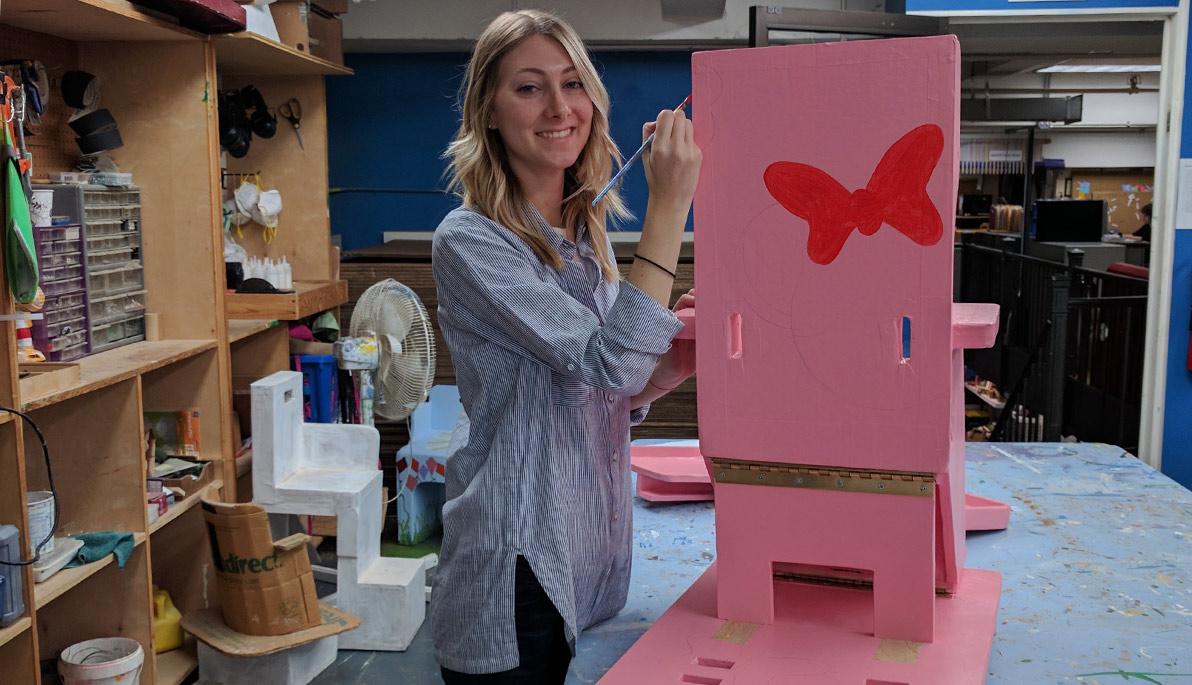
Playing the Specialty Field in Occupational Therapy
February 28, 2017
Photo: Ariel Glickman working on a chair for a 15-month-old girl who needs assistance sitting up on her own.
Occupational therapy students are required to do fieldwork as part of their studies to prepare them for their transition from student to clinician. Typically, these placements are in hospitals or schools, however one specialty area isn’t always offered as fieldwork: becoming a specialist in assistive technology. Any device that helps an individual develop increased independence can be referred to as assistive technology, for example, a remote control to access light switches, a wheelchair, or specialized keyboard.
“All occupational therapists are required to have a basic understanding of assistive technology, and our students take a course on it in their third and final year of study,” said Kelly Lavin, assistant professor at NYIT School of Health Professions. “But this is not a common area of practice for occupational therapists.”
NYIT is one of the first schools to work with the Adaptive Design Association, a nonprofit organization that creates custom adaptations for children with special needs. “Adaptive Design is a unique organization in that it is solely dedicated to providing adaptive equipment and uses low cost recycled materials to produce this equipment,” explained Lavin. The association only offers two or three fieldwork slots each year, and this year, NYIT student Ariel Glickman was given one of the coveted spots.
“Ariel expressed a desire to learn more about assistive technology for her specialty placement,” said Lavin. “The most important factor in considering Ariel for this fieldwork was her desire to gain in-depth knowledge on how to create and modify equipment for her clients.”
As part of her fieldwork, Glickman is working on a number of designs: The future occupational therapist has already fabricated a tilt-in space chair (a chair which is in a reclined position while maintaining hip and knee angles at 90 degrees), adapted a tricycle seat, and has made further modifications to a wheelchair tray that the association already adapted.
“This experience has made me fall in love with the occupational therapy field even more,” Glickman said. “It has solidified my passion to work with adaptive equipment and the pediatric population.”
While many hospitals and clinics do offer assistive technology within the realm of traditional occupational therapy settings, the equipment is very costly, not readily available, and not covered by all insurance plans. And because the technology is constantly changing, few occupational therapists design assistive technology on a regular basis. This is why the Adaptive Design Association is so distinctive and why students who do their fieldwork there walk away with a special skillset that puts them at a unique advantage.
“The ability to design custom-made equipment that meets the unique needs of each client is an incredibly valuable tool,” Lavin said. “Occupational therapists are client centered in that we strive to help clients be as independent as possible. Ariel will have the skills to construct equipment based on the specific needs of each individual.”
“I’ve always wanted to have a profession that was based around helping others,” said Glickman, who originally worked in graphic and industrial design before deciding to become an occupational therapist. “When I realized I could combine creativity with helping people, it was a perfect fit. To help design, build, and complete assistive devices that will help someone live their life more functionally is a dream come true for me.”
More Features

An Alumnus’ Commitment to the Environment
As an energy management graduate from New York Tech’s Vancouver campus, Jasdeep Gulati (M.S. ’22) is highly invested in educating people about environmental and climate sustainability.

Vancouver Faculty Win University-Sponsored Research Awards in New Program
The new Global Impact Research Grant (GIRG) program has been developed to keep Vancouver-based faculty connected to faculty and research projects being conducted on the university’s New York campuses.

Studying Climate Change One Degree at a Time
Junhua Qu (M.S. ’24) began her collegiate journey in Beijing. But, her interest in climate change took her to New York Tech’s Vancouver campus to study energy management.
